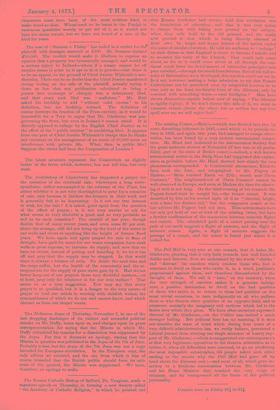The case of " Stannus v. Finlay" has ended in
a verdict for the' plaintiff, with damages assessed at /100. Mr. Stannus claimed £10,000. The verdict would make it libellous to express an 'opinion that a property was tyrannically managed, and would be a serious injury to Ireland—where if a tenant cannot let off surplus steam in print he is apt to do it in powder—but there is -to be an appeal, on the ground of Chief Justice Whiteside's mis- 'direction. There can be no doubt that the Chief Justice manifested strong feeling on the aide of the plaintiff, actually laying it -down as law that any publication calculated to bring a person into contempt or* obloquy was a defamatory libel, and that every such libel was "malicious." Mr. Butt asked his lordship to add "without valid excuse" to his definition, but his lordship refused. The definition of course destroys the freedom of the Press entirely, as it would be impossible for a Tory to argue that Mr. Gladstone was mis- governing the State, but even in Ireland it cannot stand. It is directly opposed to rulings by the English Chief Justice as to the effect of the "public interest" in modifying libel. It appears from one part of Chief Justice Whiteside's charge that he thinks any comment on the management of an estate of 60,000 acres an interference with private life. What, then, is public life ? Suppose the owner had been the Corporation of London ?










































 Previous page
Previous page